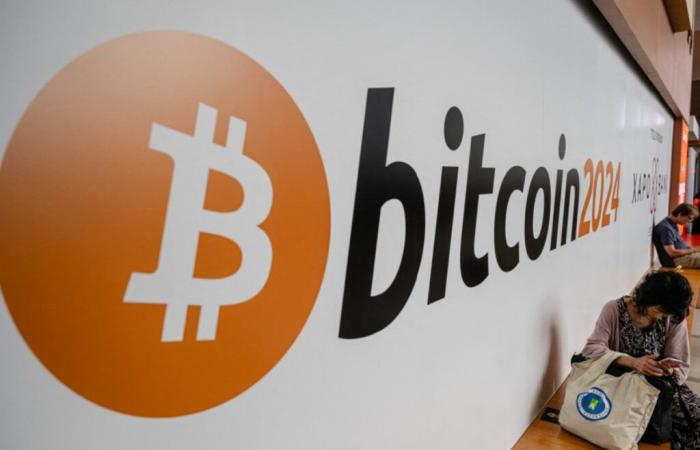
Trump's “return to power would likely emphasize deregulation, tax incentives and economic policies favorable to alternative investments, such as bitcoin,” according to one observer.
( GETTY IMAGES NORTH AMERICA / JON CHERRY )
While Donald Trump, on the morning of Wednesday, November 6, seemed close to entering the White House, the price of bitcoin exceeded the $75,000 mark for the first time, boosted by the prospect of regulatory relaxation favorable to digital currencies in case of victory of the Republican candidate.
After having exceeded its last absolute peak dating back to last March ($73,797.98), the first digital currency by capitalization climbed to $75,005 around 3:08 a.m. GMT, i.e.
an increase of around 8%
. It then caught its breath and was trading at $74,725 around 4:30 GMT.
The price of bitcoin soared in unison with the dollar in markets riveted to the first results of the American presidential election, including states won by Donald Trump with a margin considered sufficient to predict the final outcome of the election. . The Republican candidate also won a first major victory by winning the key state of North Carolina, known to be contested and highly coveted by his rival Kamala Harris.
“Bitcoin is one of the main assets at the heart of exchanges on the evening of the American election in my opinion: it is relatively liquid (easy to sell, editor's note) and
extremely dependent on the outcome of the vote
“, reacted Fredrick Collins, of the VeloData platform, quoted by the Bloomberg agency. He therefore considers it very likely “that the rise in the price (of bitcoin) is closely associated with the increased prospects of a Trump victory”.
The former president pledged during the campaign to make the United States “the world capital of bitcoin and cryptocurrencies”, by imposing
an extremely relaxed regulatory framework
.
Ether – another major digital currency – was trading around 4:30 GMT on Wednesday at $2,599, up 6%. “Memecoins”, these highly volatile parody digital currencies are also experiencing a boost, like the “dogecoin” promoted by Elon Musk – American boss and fervent supporter of Donald Trump.
Deregulation and liquidity
“The price of bitcoin closely follows Trump's position in the polls” because for investors, a Republican victory would lead to an increase in demand for the digital currency,” noted Russ Mold, analyst at AJ Bell before the election. By posing as the champion of cryptocurrencies, the businessman takes the opposite view of the Biden government, considered to be in favor of strict regulation of the sector, even if Democrat Kamala Harris tried to give pledges to reassure holders of cryptocurrencies.
The “return to power (of Trump) would probably put
emphasis on deregulation, tax incentives and economic policies favorable to alternative investments
such as bitcoin”, estimates Nigel Green, at deVere. The analyst also notes that the Republican's previous mandate “was marked by significant reductions in corporate taxes, which injected additional liquidity into markets, thus encouraging investment in high-growth assets.
“His administration could reverse some regulatory tightening measures from the Biden era and
create initiatives such as a 'strategic national bitcoin stockpile'
“, promoting investment and innovation, adds John Plassard, analyst at Mirabaud. A sign of his enthusiasm, Donald announced with great fanfare the creation of his own platform dedicated to digital currencies: called World Liberty Financial, the latter was finally experienced a launch in October without much fanfare. It offers services based on so-called decentralized finance, a mechanism which no longer allows you to go through an intermediary such as a bank for your transactions.
Investment product
At the start of the year, the price of bitcoin was driven by anticipation of the “halving”, a technical event which reduces the supply of new bitcoins approximately every four years. It consists of halving the bitcoin reward granted to “miners”, users who contribute to the operation of the digital token by providing their computing power.
The digital asset also owes its rise to the debut of a new investment product on the American market, an index fund (ETF) indexed to bitcoin, which allows investors to benefit from fluctuations in the price of this cryptocurrency without owning any directly. Since their launch on January 11 in the United States, the twelve bitcoin-backed ETF funds have accumulated the equivalent of approximately $68.51 billion, or approximately 5% of bitcoins in circulation, according to the SoSoValue site.





